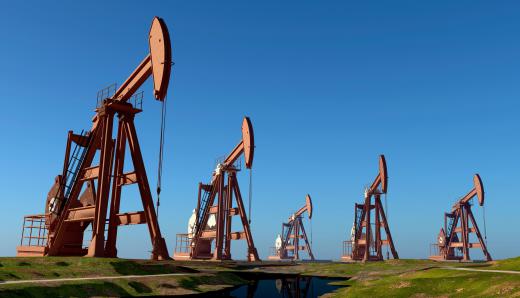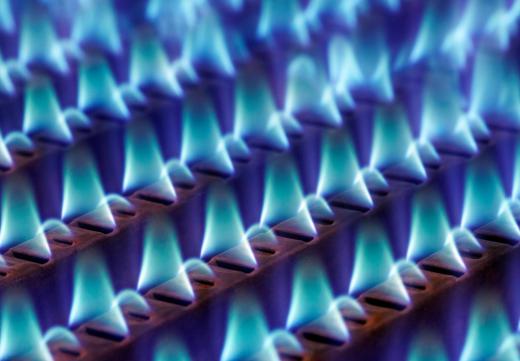What is a Hydrocarbon?
A hydrocarbon is a molecule that is composed of only hydrogen and carbon atoms. These molecules are traditionally a major focus of study in organic chemistry, the branch of chemistry that focuses on chemical compounds involving carbon. They can be described as pure or impure. A pure hydrocarbon is truly composed of only carbon and hydrogen atoms, while an impure one contains carbon and hydrogen atoms bonded to other atoms, such as nitrogen or sulfur.
There are many different forms of hydrocarbons, based on the number and arrangement of atoms. Some molecules are simply long chains of carbon and hydrogen that can contain hundreds of atoms, while others are arranged in elaborate rings and other shapes. Even the bonds between individual atoms in organic molecules can be different from each other, and many of the atoms are joined together by multiple bonds. Some organic molecules, such as fatty acids, are classified as saturated or unsaturated, based on the numbers of bonds between the atoms.

While there are many different uses for such molecules, fuels are by far the most prevalent. The bonds in many hydrocarbons contain a significant amount of energy that can be released when they are burned. Fossil fuels are made up of decayed organic matter, which is composed largely of molecules made up of hydrogen and carbon. Unfortunately, fossil fuels such as coal are considered nonrenewable resources since it can take organic matter millions of years to decay. Burning such fuels also releases gases into the atmosphere that can be harmful to the environment and to humans.

Hydrocarbon fossil fuels come in two primary forms: liquid fuels, known as petroleum or mineral oil, and gaseous fossil fuels, known as natural gas. Coal is a solid fossil fuel. All are very important because of their high energy content, but none are renewable as they are all formed through decomposition. As such, scientists are always seeking alternatives to fossil fuel energy, such as wind or solar energy.

The number of atoms and bonds included in a given hydrocarbon is usually closely related to its use. Those with few atoms and bonds are seldom used for more than simple heating or cooking fuels, while larger molecules are used for diesel fuels and even jet fuels. Some of these molecules can also be used as lubricants, though they share many common characteristics with fuels.
AS FEATURED ON:
AS FEATURED ON:













Discussion Comments
How does a moon such as Titan, produce so many hydrocarbons? I've read where it has been found in liquid, gas and solid forms. I realize this may not be the exact same as the hydrocarbons we burn in our fuel tanks, but would nonetheless still would work.
@GlassAxe- Biofuels are exactly what you are talking about, but they are not the save all answer to the energy problem that you may think. Producing energy will always consume more energy than is produced, so reaching a state where biofuels are carbon neutral will be very hard. Additionally, biofuels require crops, and the planet is also going through somewhat of a food crisis. The question of where the infrastructure to grow these crops arises as well as the question of where is there enough soil to grow these crops sustainably.
I personally think that solving the energy problem will ultimately require people changing their norms and habits to some extent. The numerous uses of hydrocarbon chains has touched every part of society, so to solve such a huge problem, people will need to consume less goods that rely on or contain hydrocarbons. This could be using less plastics, redesigning cities to make them more pedestrian, bike, and mass transit friendly, or moving the economy away from a throwaway economy to a services based economy (even in consumer goods).
Is it possible to make a renewable hydrocarbon gas that could be used in the place of fossil fuel based hydrocarbons? It seems like if we produced hydrocarbons out of plant materials, and then planted enough trees, grass, etc., to remove the carbon produced form the atmosphere, we would have little reason to worry about climate change caused by hydrocarbons. It seems like it would be easier to create renewable fuels that can be used with little need for new infrastructure or equipment, then developing alternative transportation or energy forms.
@Summing- You are right about the foolishness of basing a global economy on a resource as finite as fossil fuels, but the truth is hydrocarbons are only secondary sources of solar energy. Every living organism that went into making the precious black gold beneath our feet, originally derived their energy form the sun. This fact proves that the sun can easily produce enough energy to sustain the earth's population.
The biggest problem in the energy industry is that research and development is mostly driven by increasing profit. Until the market demands new sources of energy, whether that demand is beneficial or detrimental to society, most renewable forms of energy will remain underdeveloped. The technology exists to live without fossil fuels, but scaling the infrastructure to the point that it is possible will require a hand greater than the market.
I took organiuc chemistry in college and it was harder than all of my other classes combined. That 5 month class probably aged me half of a decade.
I remember that we spent almost a month talking about hydro carbons. It may seem like a simple concept, just hydrogen and carbon, but nothing in organic chemistry is simple. We could have probably talked about just that for the entire semester. What a relief when that class was done.
This article really highlights the tremendous folly of using fossil fuels to power the world economy. Namely, they are extremely dirt and extremely rare.
Think about this. We found the greatest energy resource the world has ever known in the form of oil. In less than 200 years we will have sucked every possible drop out of the earth, burned it up, and doomed ourselves to living with the consequences.
If we are around long enough, we will look back at some of the choices made in the 20th century as some of the most disastrous in human history. Hydrocarbons have consequences
Post your comments